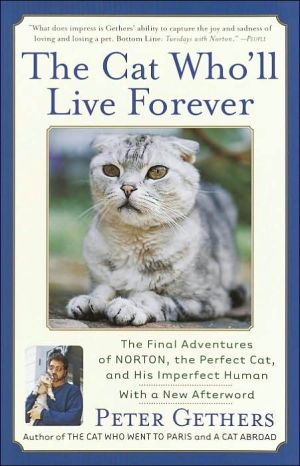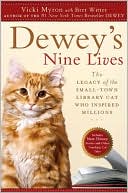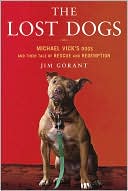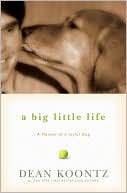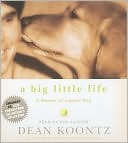The Cat Who'll Live Forever: The Final Adventures of Norton, the Perfect Cat, and His Imperfect Human
The final, poignant chapter in a trilogy of bestselling true stories about a floppy-eared Scottish Fold named Norton\ \ Peter Gethers was a confirmed cat hater until the day he received a six-week-old kitten as a gift. Walking the streets of New York with Norton tucked into his pocket, Gethers began forming an intense attachment to his new pet. Before long Norton was flying with his owner on the Concorde to Europe, sipping milk in Parisian cafés, and eating custom-made pounce pizzas at Spago....
Search in google:
The final, poignant chapter in a trilogy of bestselling true stories about a floppy-eared Scottish Fold named NortonPeter Gethers was a confirmed cat hater until the day he received a six-week-old kitten as a gift. Publishers Weekly Fans of Gethers's two previous chronicles of life with his cat, Norton (The Cat Who Went to Paris and A Cat Abroad), will be delighted by this third installment. Here, Gethers (who was feline-unfriendly until he received Norton as a present) recounts Norton's physical deterioration (kidney failure, cancer) and eventual death in 1999 at age 16. Having avoided filling the book with homilies about the nature of life and death, Gethers wryly notes that he's produced something "closer to Tuesdays with Norton than... to Meowing and Nothingness." Devoting more attention to Norton's astonishing international fame than to the cat's "final adventures," he relates Norton's (and, not incidentally, Gethers's) many brushes with greatness: Anthony Hopkins, Roman Polanski and Wolfgang Puck are among his famous fans. Gethers is at his best describing his own mixed feelings about Norton's success; fans at book signings, for instance, regularly talk to the cat and not to him. Readers will also enjoy Gethers's candid assessment of their lives together, such as his admission that he was "too selfish to get a second cat for [Norton] to socialize with," and that he slaved daily over healthful home-cooked meals for Norton but often got take-out for himself. (On-sale Sept. 9) Forecast: Norton was the first cat to get a New York Times obit, and People magazine included him in a "Notable Deaths" feature along with Stanley Kubrick, Joe DiMaggio and King Hussein. An author tour and inevitable media attention will give this book the proverbial nine lives. Copyright 1999 Cahners Business Information.
1\ A Cat Rethought\ Ever since I made the decision to write this, the third book about my gray, floppy-eared Scottish Fold pal, Norton, I have been trying to decide exactly how to begin.\ That very human, very non-cat-like flaw called over-thinking settled in all too quickly, and, as a result, more and more time passed while I sat, stared into space, and didn't type. This book would, I thought, for many reasons, be somewhat different from the others and there were distinct choices that had to be made. Each choice would clearly alter style, tone and philosophy, if I can be pretentious enough to suggest that the books about my cat actually have a philosophy (and, please, don't worry; believe me, I know enough to understand that I'm writing something much closer to Tuesdays With Norton than I am to Meowing and Nothingness).\ My first instinct was to begin like this:\ One of the reasons I became a writer is because using words the way I do is as close as I can get to putting some kind of order in this rather crazy world of ours.\ I was then going to go on and describe that one of the things in life that drives me most crazy is the way the English language is constantly mangled. As always, this is an area in which we should learn from the feline way of doing things. Cats have a way of speaking that is direct and unmistakably clear. Their words might all be the same but the meanings behind them are just a tad less ambiguous than human-speak. There is no mistaking a meow that means "feed me" for one that means "scratch my stomach." Has anyone who has been owned by a cat for any length of time ever confused an "it's nice sitting by the fire" meow for one that says "let me out" or "sorry, there's no way I'm going to the vet?" The answer's no. Of course, not only is cat body language less inhibited than ours, cats tend to speak in commands, which does make life easier, at least for them. The only question I can come up with that a cat might ask is, "Are you okay?" And, if you're not, the follow-up meow is usually another directive: "Here, shove over so I can snuggle up to you and make you feel better." Cats have definitely gotten the act of communication down to an exact science.\ But when humans open their mouths, the screw-ups are endless. The constant mis-use of "I" for "me," for example (hint: If you don't wish for me to publicly humiliate you, never say, "Just between you and I" or "Come with Freddy and I" in my presence). And the addition of the word "very" when describing something "unique." That's the same as saying "very one-of-a-kind" which is linguistically impossible. Then there's the fact that no one seems to know what the word "irony" means. It does not mean funny or snide or coincidental or satirical or anything along those lines. If you don't believe me, here's the definition straight from The Random House Dictionary of the English Language: "The use of words to convey a meaning that is the opposite of its literal meaning." If it's raining outside and you say, "Beautiful day, isn't it," that's irony. And the reason this matters to me is that the title of this book is, to a large extent, meant to be ironic, and it's important to understand that going in. Nothing and no one lives forever. Not plants, not people, and most unfortunate of all, not cats. In some ways, "life" itself is the ultimate ironic word because to live means that, eventually, you'll die. And that realization, that experience and understanding, is partly what this book is about.\ But only partly.\ I'm mainly trying to convey the feeling and the strength that comes from being in contact with a truly amazing life force.\ All of which is a long-winded way of explaining why my first choice for an opening didn't make the final cut. That and the fact that irony is not a concept that cats even understand. And although this book is written for humans, since cats can't read (unfortunately for me; if they could there's a reasonable chance I'd be the richest person on earth!), I didn't think it was appropriate to begin with something that went so against their nature.\ A second possibility was to go for pure drama. For a long time, this was my intended first sentence:\ On the day I moved into my dream apartment, I found out that my cat had cancer.\ I'm sure you can see the value of that. I mean, it's definitely a grabber. And, like everything else I've ever written about Norton, it's true. But ultimately, I rejected that, too. Too sad. Too self pitying. Way too cloyingly sentimental. And definitely not what this book is about. Most certainly not what Norton is about. What you're about to read is, I hope, anything but sad. It is not about illness, it is about health. Rather than the trauma of being sick, it is about the satisfaction and the bonds that arise as we age and learn how to care for each other--and learn how to accept that caring from others.\ Anyone who has read earlier tales of life with Norton can tell you that I will almost always go for the gag--on paper and in life--and also that I am not a big fan of fake sentiment (several ex-girlfriends would say I'm also not a fan of real sentiment). But I am a fan of genuine emotion and, luckily for me, rarely is that exclusive of laughter. So in no way is this book depressing. It is, I hope, hilarious and joyful and as life affirming as it's possible to be without turning into a Steven Spielberg movie.\ In a way, this rambling and over-thinking has actually done what my two initial openings couldn't possibly do. I did manage to bring some order, not just to this book but to my thought process. And, probably more importantly, I realized that, despite what I wrote earlier, the title is not really ironic.\ The more I thought about it, the more I realized that in many ways my little gray pal will indeed, live forever. And live exactly the way he'd like to: bringing pleasure and, on occasion, even meaning into other people's lives. I guess that's why, when push came to shove, I realized that what this book really is about is quite simple.\ It's about my cat Norton.\ Exactly the same as the other two books. And that's why the real opening is as follows:\ The wonderful thing about having a relationship with a cat--one of the many wonderful things about having a relationship with a cat--is that you never have a clue where that relationship will lead you . . .\ 2\ A Cat Revisited\ The wonderful thing about having a relationship with a cat--one of the many wonderful things about having a relationship with a cat--is that you never have a clue where that relationship will lead you. It can, and often does, lead towards love. But it can also lead towards frustration. And sometimes heartache. Or comfort. It can lead towards other relationships, feline as well as human. Sometimes it can lead to all of the above--in various combinations and even at the same time.\ That relationship can also bring you to something truly extraordinary and life changing, as has been the case with my extraordinary and life changing Scottish Fold, Norton.\ If you've read the many words I've already written about my amazing pal over the years, you won't need to be convinced of his ability to astound. You have already witnessed how he is--in no small way--responsible for my love life, my house, my travels, my professional success, and whatever emotional maturity I've managed to achieve. If you haven't read my rapturous descriptions, here's a little something to chew on (or scratch on, as the case may be) . . .\ The backstory:\ When we first met book publisher/writer Peter, he was your basic, insensitive oaf. Also a cat hater.\ Enter Norton, age 6 weeks, a gift from one of Peter's girlfriends, Cindy.\ Cindy goes. Norton stays. Peter becomes so attached to his kitten it borders on insanity (but is also totally deserved). Many other girlfriends come. Many other girlfriends go. Norton clearly has to take things into his own paws if he's ever going to have a stable home life.\ Peter has to travel for business. So Norton travels with him. This changes in the years to come. Norton eventually has to travel for business so Peter travels with him. They go to Fire Island (Norton is stunned by how low his owner will sink to get a date for New Year's Eve), California (Norton meets the folks), Vermont (Norton goes cross country skiing), Florida (Norton goes to a spring training baseball game and becomes a huge fan of Andres "El Gato" Gallaraga. He also falls through the roof of a hotel restaurant, scaring two old ladies to death.), There's much time spent in Paris (Norton greets Harrison Ford with a . . . um . . . petit morceau du merd dans le bain. He also scares away a luscious Danish model and goes clubbing with Roman Polanski), and a sojourn to Amsterdam (Norton goes to the taping of a topless Dutch TV quiz show--see, now aren't you sorry you didn't read the first book?!). Peter takes up with Janis, with Norton starring in the crucial matchmaking role of Dolly Levy. Peter buys Norton a house in Sag Harbor. Peter deals with the death of his father. Peter, thanks to you-know-who, finally understands what love is.\ And then Peter writes a book called The Cat Who Went to Paris, which is about all of the above, and Norton becomes the Tom Cruise of cats. Also the William Styron of cats, since most true fans of the book are convinced he dictated the whole thing to Peter, who merely used his opposable thumbs to get himself a book contract.\ Thanks to Tom . . . uh, Norton . . . Peter gets to spend a year in Provence, observing and chronicling the further adventures of his gray, folded-eared friend. In Europe, a three-star French chef creates a marzipan mouse for Norton's pleasure. The sweetest cat in the world almost starts World War III in Italy over an uneaten sardine. In addition, Norton also: rides a camel (don't ask), goes to Spain, suns himself in Sicily, tours the cathedrals of the Loire valley, skis in the French Alps, visits Anne Frank's house in Amsterdam and, back in southern France, charms the most charming village in the Luberon Valley.\ Then it's back home. Which means New York City and Sag Harbor, Long Island.\ Peter writes A Cat Abroad. It wins the Nobel Prize, the Pulitzer Prize, and is on the New York Times bestseller list for over 4 years (I just wanted to see if you were paying attention. The first sentence in this paragraph is true. The rest is a slight exaggeration).\ In the first book, Peter learned about love from Norton. In the second book, Peter learned about life. Peter decides there will be no third book because he thinks he has nothing left to learn from his cat . . .\ We're up to Norton's 10th birthday, which is a little over 8 years ago.\ Which is where I left off.\ And which is where I'll begin now. And the reason there is a Book #3 is because several years ago, I learned there was indeed one more very important thing I had to learn from my beloved little cat.\ Maybe the most important thing of all . . .\ 3\ An American Cat\ Both cat and human had to make a fairly big adjustment to life upon returning to America from a year in the south of France. Norton had to readjust to chowing down on regular cat food (no combo cans of lapin et foie, his very favorite). His dad had to get used to working like a real person again. I also had to realize that I could no longer mutter any snide thing I wanted to in public, since now people could actually understand English.\ In other words: we both had to prepare ourselves for being normal again, which was not my favorite situation to be in. Luckily for me, Norton made it very difficult to be absolutely normal.\ When I first realized that life was truly going to be different on a permanent basis was when we went on our publicity tour for A Cat Abroad. I had been pretty amazed at the love and affection that had been showered upon my cat when Norton and I traveled together to promote The Cat Who Went to Paris--but that was nothing like this.\ One of the first stops was Knoxville, Tennessee. At a Davis-Kidd bookstore, I gave my usual semi-witty speech and reading while Norton calmly sat by my side, in his favorite Sphinx-like pose, looking for all the world like he was my translator. When I was done talking, people lined up, ostensibly to have me sign their books but I'm sorry to say they didn't really care about my signature (or anything else about me). Oh, they were mostly polite, but they were all there to pet and talk to Norton. One man was so jazzed by the experience, he offered me a ticket to the city's biggest yearly event, the University of Tennessee/University of Florida football game, which was taking place the next day. When I thanked him but said--kiddingly--that I couldn't possibly go without my pal because he was a huge Tennessee fan, the man looked at Norton and said, "Hell, I'll get him a ticket, too." I have to say, it was tempting but I finally decided it was better that I stick to the tour schedule than take Norton to drink beer and eat hot dogs and root for UT.\ One extremely nice, middle-aged woman came shyly forward when the crowd began to thin. She glanced at me, stared lovingly at you-know-who and said, "I drove over 400 miles to see him." Her tone was even more reverential than her words. It was a lot like she was viewing the front of one of those refrigerators in someone's RV where the grease has coagulated into a vision of the Virgin Mary. It was so touching to see the attachment she had for my cat, I let her spend a few minutes alone with the star of the evening, who was extremely nice, purring contentedly during their chat I don't know what they chatted about--and I don't think I want to know--but I can say with certainty that she was not at all disappointed. Afterwards she thanked him, was thoughtful enough to thank me, too, then presumably drove another 400 miles back home.\ From the Hardcover edition.
\ From Barnes & NobleThe Barnes & Noble Review\ Brace yourselves, Norton fans: This is the third and final installment in the saga of the Cat Who Went to Paris (and Italy and Florida and Sag Harbor, Long Island), but I'm here to tell you it's a happy book you won't want to miss -- though I can't promise you won't be crying at the end. \ In case you've kept to the dog side of the aisle for too long, Norton, a nine-pound Scottish Fold cat, was decidedly special, perhaps even un-catlike. He kept his human, Peter Gethers, company by walking along a crowded beach for two miles, and would wait in the bushes until Peter was ready to go home. Norton learned how to unlock a bedroom door, persuaded two reluctant Italian cooks to do a book with Peter, and even learned to activate the automatic seat warmer for his side of the car. He also traveled well and happily in a shoulder bag, on planes, boats, and subways, and was always ready to make new friends.\ More important, as all pets do, Norton taught his owner about life and love, especially unconditional love, and the pleasures and pains of being involved. He transformed Peter from a self-described insensitive oaf into a man who would do anything, but anything, for his cat.\ This part of Norton's life begins when he turns ten, still down-to-earth even though he is recognized on the streets of Paris and receives his own fan notes. Peter does not share this celebrity. In fact, in one of the best stories in the book, Peter and his girlfriend, Janis, are invited to a celebrity movie premiere to meet someone named Tony only because of their connection to Norton. Ultimately, Norton comes to the post-screening party, receives a royal welcome from the guest of honor, Sir Anthony Hopkins, a Norton fan, and is surrounded by well-wishers. Standing on the sidelines, Peter is approached by Lauren Bacall, who says in that inimitable voice: "I don't know who you are and I don't know why you're here. But if I want to talk to Tony Hopkins, who's an old and dear, dear friend...why do I have to stand in line behind your f***ing cat?"\ Though Norton appears to be purring his way into middle age, he develops kidney disease and, later, cancer. Anyone who has ever struggled with the serious illness of a beloved animal will empathize with Peter as he cooks special meals for Norton and administers holistic supplements. Norton's ending is characteristically, full of love, courage, and dignity. Once again, Norton points up the best qualities in animals and one of the special joys in life. (Ginger Curwen)\ \ \ \ \ \ Publishers WeeklyFans of Gethers's two previous chronicles of life with his cat, Norton (The Cat Who Went to Paris and A Cat Abroad), will be delighted by this third installment. Here, Gethers (who was feline-unfriendly until he received Norton as a present) recounts Norton's physical deterioration (kidney failure, cancer) and eventual death in 1999 at age 16. Having avoided filling the book with homilies about the nature of life and death, Gethers wryly notes that he's produced something "closer to Tuesdays with Norton than... to Meowing and Nothingness." Devoting more attention to Norton's astonishing international fame than to the cat's "final adventures," he relates Norton's (and, not incidentally, Gethers's) many brushes with greatness: Anthony Hopkins, Roman Polanski and Wolfgang Puck are among his famous fans. Gethers is at his best describing his own mixed feelings about Norton's success; fans at book signings, for instance, regularly talk to the cat and not to him. Readers will also enjoy Gethers's candid assessment of their lives together, such as his admission that he was "too selfish to get a second cat for [Norton] to socialize with," and that he slaved daily over healthful home-cooked meals for Norton but often got take-out for himself. (On-sale Sept. 9) Forecast: Norton was the first cat to get a New York Times obit, and People magazine included him in a "Notable Deaths" feature along with Stanley Kubrick, Joe DiMaggio and King Hussein. An author tour and inevitable media attention will give this book the proverbial nine lives. Copyright 1999 Cahners Business Information.\ \ \ Library JournalNorton, the Scottish Fold cat of The Cat Who Went to Paris (LJ 9/1/91) and A Cat Abroad (LJ 10/1/93), is back. In this last installment of his feline's life story, Gethers again shares humorous stories of the celebrities that Norton has charmed Anthony Hopkins, Marcello Mastrionni, and Wilt Chamberlain delighting readers with his cat's adventures. The tone, however, turns somber when a veterinarian discovers that Norton has kidney problems, and Gethers shamelessly admits his own cowardice during this period. After Norton's health stabilizes, life continues at a less rapid pace until it is discovered that Norton has cancer. The author then realizes how much love he owes his furry companion and cares for him 24 hours a day. This bittersweet story of a cat who teaches his human friend lessons in loving and coping with illness is essential for all public libraries. Eva Lautemann, Georgia Perimeter Coll., Clarkston, GA Copyright 2001 Cahners Business Information.\ \ \ \ \ School Library JournalAdult/High School-Norton, the urbane yet humble Scottish Fold, became famous as The Cat Who Went to Paris (1992) and continued his adventures in Provence in A Cat Abroad (1994, both Fawcett) but, to the disappointment of his many fans, took early retirement at the age of 10. Gethers now reveals the details of the feline's final years. Here Norton travels less-though he still makes an occasional appearance at Spago, takes the Concorde to Europe, and upstages film stars from Paris to the Hamptons. Though kidney failure and cancer slow him down and ultimately defeat him, he never loses his charm, composure, or talent for making the most of his life. In his old age, Norton makes a farewell tour of all his favorite spots, undergoes medical procedures with dignity, and enjoys the sun on his preferred park bench-inside a most amusing dog run in New York City. Though it's clear that Gethers has a high-powered career, he somehow succeeds in portraying himself simply as a callow fellow blessed with an awesome cat. As Norton's health problems gradually take over both their lives, the author learns how to care for an invalid and, ultimately, to mourn the death of a loved one. Those who knew Norton when he was young will be grateful that Gethers shared this story. Others can find a different perspective here on medicine, aging, friendship, and grief; the value of humor; or just the meaning of life.-Christine C. Menefee, Fairfax County Public Library, VA Copyright 2001 Cahners Business Information.\ \ \ \ \ Kirkus ReviewsFamed feline Norton, the Scottish Fold, who enchanted readers in The Cat Who Went to Paris (1991) and A Cat Abroad (1993), makes his final appearance here, in a highly engaging collection of anecdotes, which Gethers weaves into a heart-wrenching tale of love and loss. In a witty style reminiscent of William Styron, Gethers amuses with memories about traveling throughout the US and Europe with his famous, inseparable companion. During these journeys, Norton indulged in superb cuisine, charmed haughty concierges, and was accosted by throngs of fawning fans. Back in their weekend retreat in Sag Harbor, Long Island, Norton and Gethers mingled with the Hamptons elite, which included actor Anthony Hopkins, who invited the author to a private party on the condition that Norton would also attend. Gethers also escorted Norton to the home of an intimidating investor, known as the "Nightmare on Wall Street," who ignored Gethers as she rolled around on the floor with Norton. These humorous accounts of the author being upstaged by his cat stand on their own, but Gethers goes on to add a mournful drama. Soon after man and cat moved into their dream apartment in Greenwich Village, tragedy struck: Norton was diagnosed with cancer. Suddenly, Gethers becomes a sobbing hysteric, as the fury creature with whom he shares a bond of unconditional love succumbs to illness. Although Gethers confesses to living selfishly-he has always refused to clutter his life with a wife and children-Norton's illness transformed Gethers into a self-sacrificial caretaker who sought renowned veterinarians, gave Norton daily injections of saline solutions, and cooked natural home-remedy dinners. A good balance oflaugh-out-loud and tear-jerking recollections: Gethers makes Norton immortal, delivering an affecting narrative that belongs on the bookshelf of all cat-fanciers.\ \
